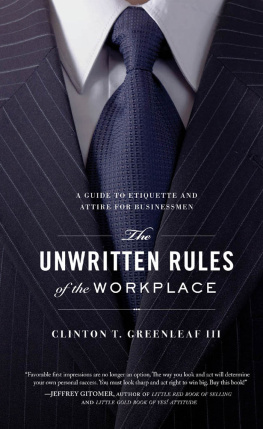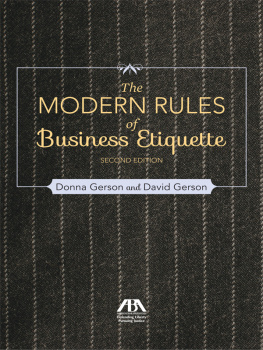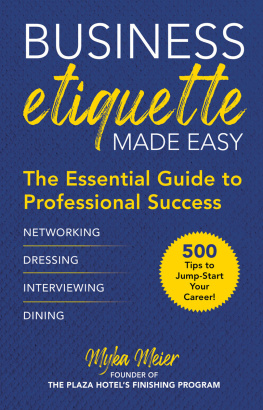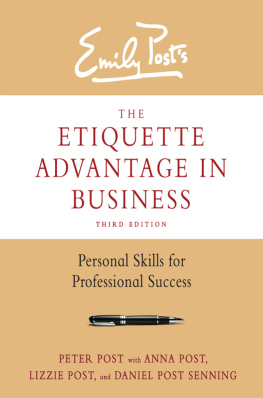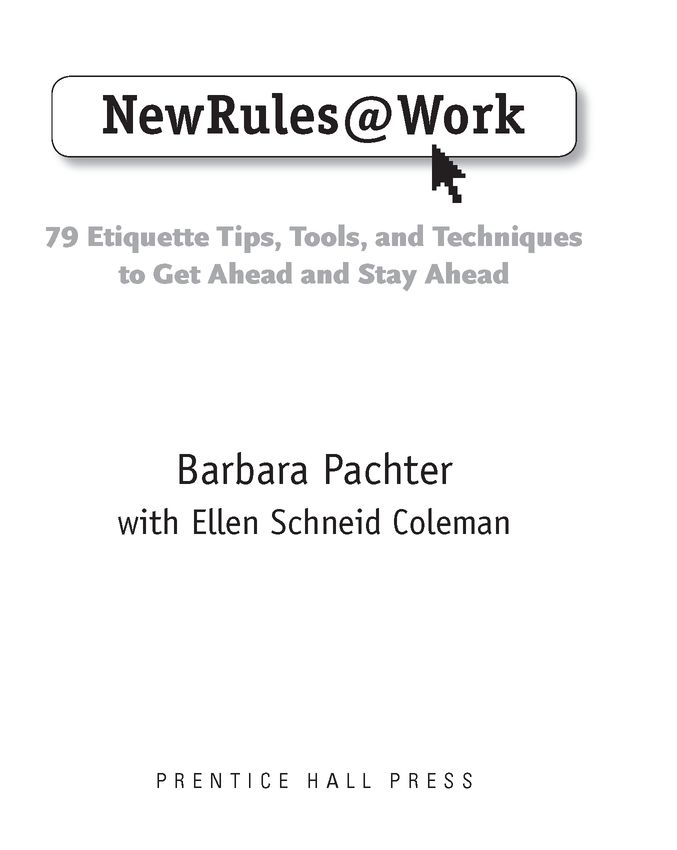Table of Contents
Most Prentice Hall Books are available at special quantity discounts for bulk purchases for sales promotions, premiums, fund-raising, or educational use. Special books, or book excerpts, can also be created to fit specific needs.
For details, write: Special Markets, The Berkley Publishing Group, 375 Hudson Street, New York, New York 10014.
INTRODUCTION
No Way! Who Would Do That?
Meet Jonathan. He graduated at the top of his class from an Ivy League school and then got his MBA from a leading business school. Jonathan quickly landed a high-level dream job as a technology consultant. Things were really going his way until his first client dinner. When he sat down at the table he put his chewing gum underneath his plate. Jonathans new boss was appalled by his behavior; the client probably was, too, though he never said anything. The next day, in his bosss office, Jonathan was told, If anything like that happens again, youre out of here.
You may say: He didnt mean to do it. He probably didnt know. Cut him a break. It was an innocent mistake.
Or maybe youre saying, No one would do that! I would never do that. And perhaps you wouldnt, but are you certain you wouldnt commit some other blunderone with the potential to sideline your career?
People often believe you can slip up here and there and it wont matter in the long run. Take it from me: Your behavior, including the bloopers, blunders, and innocent mistakes matter. They can matter big-time!
I know this is true, not because I read it somewhere, but because I hear it all the time from those who attend my classes and seminars and those I coach, from my corporate clients, and from the countless letters and emails I receive from those whove read my books and articles in newspapers and magazines as well as those whove heard me speak.
Im a business communications trainer and coach. I have been teaching business etiquette for more than fifteen years. I give approximately one hundred seminars and coaching sessions a year to a wide range of business professionals at all rungs on the corporate ladder. They come from a wide variety of companieslarge and smalland from all across the country as well as from overseas. Ive also taught in numerous countries including Kuwait, France, and Mexico, which has given me insight into our increasingly global business environment.
My clients include some of the worlds leading business and financial players, like NASA, Pfizer Inc., and DaimlerChrysler. They hire the best and the brightest. Yet I have seen promising, even brilliant, careers derailed, sidetracked, or blown sky-high, simply because people made mistakesin meetings, at business meals, on the telephone, at the office holiday party, when they got dressed in the morning, in the emails they sent, while giving a presentation... the list goes on and on.
Take the woman who answered her cell phone during a job interview and proceeded to conduct a conversation with her kids. Until that moment, the job was hers; after the phone call, the offer disappeared. And what about the salesperson who feigned a heart attack to get his customers attention? He lost the customer as a result. Or the programmer who was trimming his fingernails during a meetingone of his clippings went flying into the air. He leaned over and asked the woman next to him, That didnt go into your coffee, did it? He was no longer asked to meetings.
If you think Ive made these stories up or that I am exaggerating them, I can guarantee that I am not. I am an irresistible force when it comes to attracting bad behavior stories. People love sharing their horror stories with me. Bosses tell me what their employees do and employees share with me what their bosses do.
What You Dont Know Really Can Hurt You
Before you think I am being harsh, let me set the record straight: I know most people dont set out to be jerks, and I am willing to extend the benefit of the doubt to all of those blunderers barging through life with bewilderingly bad behavior. I know that, in most cases, they are simply oblivious to the way others view their behavior. I know that they dont even think about establishing rapport with the person across the table at the conference or on the other end of the phone as they are multitasking. Its true and unfortunate for them that theyre not thinkingat least, not thinking about the consequences of their actionsbecause, in most cases, they are the ones whose careers will be put on hold by their behavior.
Ive witnessed and heard it too many times from professionals whose careers have been stalled or derailed completely not to believe itall of your actions have consequences, especially those that make others stop and say, What the heck was she thinking? or, Do I really want to work or do business with him?!
Business professionals often limit their success because of the way they behave, how they present themselves, or what they door dontsay. More often than not, as the following examples demonstrate, they dont even know that they are doing so.
A strategic planner wheeled around after a colleague held the door for her and read him the riot act.
After spending the afternoon in a meeting with a female colleague, the marketing manager called her at home that night. He was furious that she hadnt told him his fly was open.
An automotive parts buyer couldnt understand why her local Japanese supplier wouldnt accept her business proposal. She had put off visiting him and he didnt want to work with her until he had met her.
These real-life examples are telling illustrations of what can happen to any of us as we go about the business of doing business. They also illustrate the variety of issues that fall under the broad banner of business etiquette. Just knowing which fork to use wont cut the mustard (so to speak) in todays business environment. Even things men and women would have taken for granted, say, twenty years ago, cant be taken for granted today. Who back then would have thought for example that a man would get chewed out by a woman simply for holding a door open? Sounds a bit extreme, but dont laugh, it happens! What should a manor a woman, for that matterdo in such a situation? NewRules@Work clues you in on that and a great deal more of the dos and donts of business etiquette.
In todays business environment, etiquette is not just a matter of being polite. More than ever, each of us must know how to maximize those social skills that give us the confidence to handle people and situations with tact, diplomacy, and respect; essential skills that help us avoid business blunders that can cause embarrassment, discomfort, or worseas our poor consultant learnedcost us the relationship, business opportunity, account, client, promotion, or our job.
Knowing a lot about your area of expertise isnt always enough to move you up the organizational chart. Of course, you have to know your field and do your job well. However, it takes more than that in todays highly competitive workplace. And thats where etiquette comes in. The ability to get along with others, demonstrate good manners, and make others feel comfortable is increasingly important. Without these skills, business can be lost, your voice wont be heard at meetings, your staff can lose respect for you, and your managers wont promote you. A polite, professional manner is a key component of how successful you will be.


